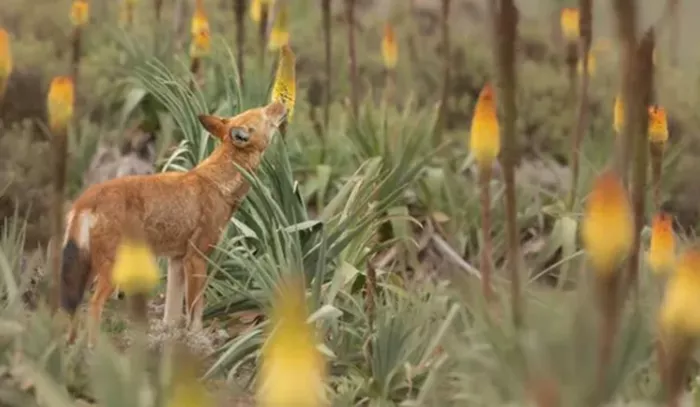Ethiopian wolves, a species known for their strictly carnivorous diet, have been observed feeding on the nectar of Ethiopian red hot poker flowers (Kniphofia foliosa). This surprising behavior marks the first known instance of a large carnivore consuming nectar, and researchers believe these wolves may even be among the first large carnivores to serve as pollinators, though further studies are needed to confirm this.
The findings, published on Nov. 19 in the journal *Ecology*, offer new insights into the behavior of these highly threatened animals. “These findings highlight just how much we still have to learn about one of the world’s most-threatened carnivores,” said Sandra Lai, an ecologist at the University of Oxford and co-author of the study.
The nectar of the Ethiopian red hot poker flowers, with their red and yellow blooms, is sweet and attracts a variety of pollinators, including insects and birds. Researchers had previously noticed the wolves licking the flowers during field studies, prompting them to investigate the behavior in more detail.
For four days, the researchers followed six Ethiopian wolves from three different packs. While most of the wolves visited only a few flowers, one wolf licked nectar from 20 flowers, and another visited 30 in a single feeding session. The wolves primarily licked the lowermost, mature flowers, which contained the most nectar. In doing so, their muzzles became coated in pollen, leading researchers to suggest that the wolves could be transferring this pollen to other flowers, potentially aiding in pollination.
However, it is still unclear whether the wolves are effective pollinators. Nectar is not a major part of their diet, so more research is needed to determine how frequently they visit the flowers. Additionally, there is no evidence yet to suggest that a wolf could transfer enough pollen to successfully pollinate a flower.
The Ethiopian red hot poker flowers attract various species, making it difficult to assess the significance of the wolves’ potential role in pollination. Regardless of their pollination efforts, many other animals, including humans, have also been observed feeding on the flowers’ nectar.
Claudio Sillero, a conservation biologist at the University of Oxford and co-author of the study, recalled first encountering the flowers when he saw local children licking them in the Bale Mountains. “The nectar was pleasantly sweet,” he said. “When I later saw the wolves doing the same, I knew they were enjoying this unusual source of energy.”
Further research is planned to explore the role of nectar in the wolves’ diet and to investigate whether they are indeed acting as pollinators.
Related topics:
- Botanical Pimpin’: Transforming Plants into Living Masterpieces
- Zordi Harnesses AI and Robotics to Cultivate Flavorful Strawberries Indoors
- Plants Get a Second Chance to Blossom


